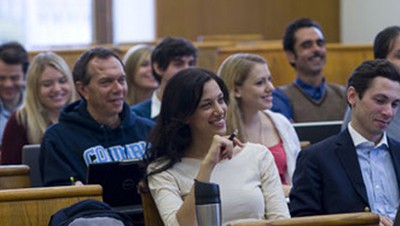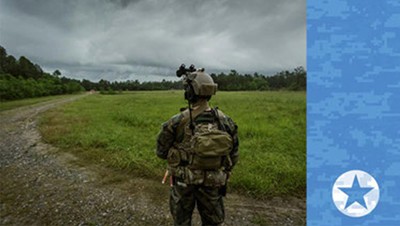Veteran Transition: Academic Excellence and Career Readiness
Courses for veterans as they transition from active service to college and the workforce.
ATTAINING HIGHER EDUCATION
Prepare to transition to college using intentional decision-making. Aimed at active duty service members and veterans, with this course you will learn about the college admission process, including financial aid, to help you choose a right-fit college.
Course Modules
- Introduction: Intentional Decision Making
- How We Choose
- The Importance of Values
- The Logical Next Step
- Options and Opportunities
- Talking it Through
- Making a Choice
- Introduction: Choosing a Right-Fit College
- Important Factors to Consider
- Basic Overview of Higher Education
- Major Selection
- Questions to Ask
- Making the Most of Problem Sets
- Creating a College List
- Introduction: The College Application Process
- The College Application
- The Essay
- Letters of Recommendation
- Interviews
- Admissions Decisions
- What to Do Once Accepted
- Introduction: Financing Your Education
- VA Benefits
- Types of Financial Aid
- FAFSA
- Non-Federal Grants & Loans
UNIVERSITY STUDIES FOR STUDENT VETERANS
The skills you learned in the military will go a long way toward helping you succeed in college, but if you’re looking for some extra support – or an academic tune-up – then you’ll find it in this course. We know that the culture of higher education is different from the culture of the military in meaningful ways, and we also know that one of the keys to excelling in college - especially for student veterans - is learning to navigate these differences successfully, right from the very start.
Course Modules
- Introduction: Metacognition and Mindset
- How Learning Works
- Activating Prior Knowledge
- The Importance of Effort
- Mindset
- Metacognition in Practice
- Introduction: Active Reading and Note-Taking
- How to Activate Your Reading
- Questions to Ask Yourself
- Effective Text Marking
- What Kind of Note-Taker Are You?
- Cornell Note-Taking
- Iterative Note Review
- Introduction: What is a Technical Course?
- How to Think About Technical Courses
- The Myth of the “Math & Science Person”
- Insightful Studying
- The Distributed Study Model
- Making the Most of Problem Sets
- The Value of the First Exam
- Studying in Groups
- Introduction: Hard Reading
- Context is King
- Kinds of Academic Texts
- Three Approaches to Reading
- Reading Strategies
- Introduction: Good Writing
- Guidelines
- Iterative Writing
- Structure
- Thesis/Claim vs Opinion (Related Video)
- Introduction: Effective Time Management
- How to Perform a Time Audit
- The Art of Calendaring
- Getting Real About Study Time
- The Pomodoro Technique
- Tools for Organizing Your Time
- More Time Management Tips
- Making Time for Wellness
- Introduction: Navigating Campus Culture
- The Hidden Curriculum
- Academic Integrity
- Interacting with Faculty
- Good Email Etiquette
- Asking for Help
FIND YOUR CALLING: CAREER TRANSITION PRINCIPLES FOR RETURNING VETERANS
The culture of corporate America is different from the culture of the military, and we also know that one of the keys to integrating back home and excelling in the civilian workforce - especially for veterans - is learning to navigate these differences successfully, right from the very start. This course aims to help you do just that.
Course Modules
The purpose of this lesson is for service members to understand that being a good citizen and a good community member is at the core of being a good American and making a successful career transition. Our guest lecturer for this lesson is Sebastian Junger. Sebastian is an award winning war correspondent, documentary filmmaker, #1 New York Times best-selling author, and a special correspondent at ABC News. You may have seen his war documentary, Restrepo, filmed in the Korengal Valley of Afghanistan. In this lesson, Sebastian will discuss elements of his book Tribe and the challenges veterans face while transitioning back home.
Prudentia was considered by the ancient Greeks as the cause, measure, and form of all virtues. In other words, it is considered to be the mother of all virtues. Your ability to think, make sound judgments, and good decisions forms the basis for everything that you do and who you are as a person. In this lesson, we will hear from Dr. William Deresiewicz - a best-selling author and contemporary thinker - he will discuss a speech that he gave at West Point called Solitude and Leadership. He makes the argument that in order to be a good leader, you need solitude in order to be able to think for yourself, otherwise you’re just a follower.
Veritas is the name given to the Roman virtue of truthfulness, which was considered one of the main virtues any good Roman could possess. You may have heard the Latin phrase, “in vino, veritas” meaning in wine there is truth. For this lesson, we are taking veritas and truthfulness, and applying it to your authenticity, to who you are as a person, and then being able to develop a personal brand and communicate that brand during a job interview and to others in your community.
If we have a strong devotion in what we do, we are more likely to achieve excellence in that endeavor. In the military, we had a passion for serving our country and the mission. As we transition, we need to seek a new passion, a new mission, so we can achieve that same level of excellence in the next stage of our lives. In this lesson, we’re going to hear from Simon Sinek about discovering our why and purpose. Simon is an organizational consultant, inspirational speaker, and author of five books, including: Start With Why, Find Your Way, and the newly published The Infinite Game.
In the beginning of his Meditations, Marcus Aurelius listed off a number of virtues, like self-control, practicality, rationality, and tolerance, which all together, make up humanitas. In other words, people who practice humanitas, practice good decision making. They are good choosers. They understand what decisions need to be made, when, and the impact those decisions will have on themselves and others. In this lesson, we’re going to hear from the world’s expert on choice - Dr. Sheena Iyengar. She is a professor at Columbia Business School and author the of the best seller The Art of Choosing. Dr. Iyengar is also blind, and has been since she was a young child. She obviously has had to make some difficult decisions in her life. I hope you enjoy her lesson.
The Greek aphorism “Know Thyself” was one of 147 Delphic maxims inscribed in the entranceway of the Temple of Apollo at Delphi. This phrase was later expanded upon by the philosopher Socrates, who famously taught that “The unexamined life is not worth living.” And now, several thousand years later, even the Marine Corps leadership traits and principles builds upon this ancient maxim, “Know yourself and seek self-improvement.”
n this lesson, we’re going to learn about emotional intelligence and how our emotions, ego, identity, and vulnerabilities impact how we interact with people and how we make decisions on a day-to-day basis. We’re going to hear from Dr. Robin Stern - Associate Director of the Yale University Center for Emotional Intelligence.



